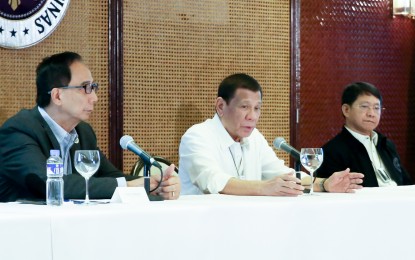
TASK FORCE VS. ASF. President Rodrigo Duterte convenes with Agriculture Secretary William Dar, Interior and Local Government Secretary Eduardo Año and other officials to discuss the updates on the African swine fever during a meeting at the Malacañan Palace Tuesday (Feb. 25, 2020). Duterte signed Executive Order No. 105 on February 21 creating a national task force to “oversee and implement effective and coordinated policies and strategies to manage, contain and control the spread of such diseases.” (Presidential photo)
MANILA – President Rodrigo Duterte has signed an executive order creating a national task force to prevent the entry, contain, and control animal-borne diseases such as African swine fever (ASF) following the sharp rise in the number of cases nationwide.
Duterte signed Executive Order No. 105 on February 21 creating a national task force to “oversee and implement effective and coordinated policies and strategies to manage, contain and control the spread of such diseases.”
The EO recognizes that the Department of Agriculture (DA) has confirmed that “backyard and commercial farms in several areas in Luzon have been affected by the ASF virus, and more than 67,000 hogs have been culled to control the spread of said disease.”
“The current ASF outbreak, which poses catastrophic effects on the Philippines' swine industry, the production supply chain and the economy, as a whole requires drastic disease control and preventive measures, including mass culling of the affected hog population” the EO read.
The task force will be chaired by Agriculture Secretary William Dar while Health Secretary Francisco Duque III will be vice-chair.
Members of the task force are Executive Secretary Salvador Medialdea, Interior Secretary Eduardo Año, Environment Secretary Roy Cimatu, Trade Secretary Ramon Lopez, Finance Secretary Carlos Dominguez III, Budget Secretary Wendel Avisado, DSWD Secretary Rolando Bautista, Foreign Affairs Secretary Teodoro Locsin Jr., Transportation Secretary Art Tugade, Defense Secretary Delfin Lorenzana, Labor Secretary Silvestre Bello III, Justice Secretary Menardo Guevarra, Tourism Secretary Bernadette Romulo-Puyat, Customs Commissioner Rey Leonardo Guerrero, and Technical Education and Skills Development Authority chief Isidro Samson Lapeña.
The task force will formulate appropriate policies, regulations, and measures to address issues relating to animal-borne diseases, including those concerning the ASF virus; and develop a national risk reduction program and a comprehensive framework to manage, contain, control and eradicate animal-borne diseases, including but not limited to, movement control/quarantine, biosecurity, surveillance, proper waste disposal, and other control measures.
It will also supervise and monitor the implementation of the policies, regulations, measures, and programs to be developed, as well as interventions relative to the improvement of customs and quarantine measures, to ensure the integrity of all international ports of entry and inspection of markets for imported goods that contain products that may be infected by animal-borne diseases; and formulate and issue zoning and movement plans for the prevention and control of animal-borne diseases, monitor its implementation, and ensure compliance.
It is also tasked to develop and implement a national public awareness campaign on animal-borne diseases which may pose a threat to the country; develop programs to aid those affected by animal-borne diseases, such as the grant of financial assistance, livelihood alternatives, and necessary skills training; enhance contingency and action plans for emergency disease control; and prepare and submit timely reports on the status or animal-borne diseases, including the ASF virus.
All departments, bureaus, offices, agencies or institutions of the government, including government-owned-or-controlled corporations and state universities and colleges, are hereby directed, and local government units are enjoined, to render the necessary assistance to the task force.
On the other hand, the private sector, non-government organizations, and other stakeholders are encouraged to participate and support the implementation of the programs and activities to be formulated.
Funding for the implementation of the task force will be sourced from available funds of the member-agencies and if necessary, the budget department may identify other appropriate funding sources.
On Tuesday, Duterte held a meeting with Cabinet members to discuss efforts to manage the highly-contagious hog disease.
In a chance interview with reporters in Malacañang, Duterte said hogs that are ASF-free should be properly branded to prevent further contamination and hasten the flow of pork and products in the country.
Livestock branding, an important part of monitoring for diseases in animals, refers to hot branding large stock with a branding iron or other techniques which include freeze branding, inner lip or ear tattoos, earmarking, ear tagging, and radio-frequency identification, tagging with a microchip implant among others. (PNA)
